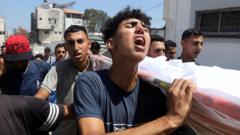**As Ayatollah Ali Khamenei potentially emerges from his secretive refuge, he confronts an Iran beset with military defeats and rising calls for change, reshaping the landscape of leadership and public sentiment.**
**Iran's Supreme Leader Faces a Transformed Nation After Two Weeks in Hiding**

**Iran's Supreme Leader Faces a Transformed Nation After Two Weeks in Hiding**
**Ayatollah Ali Khamenei's Seclusion Marks a Pivotal Moment Amidst Domestic Unrest and International Tensions**
After nearly two weeks of isolation in a covert bunker, Iran's supreme leader, Ayatollah Ali Khamenei, who is 86 years old, may soon find himself stepping back into a drastically altered nation following the recent ceasefire in the conflict with Israel. His protracted absence is fueled by fears of assassination, particularly amid claims from Israeli leadership that an attack on him could still be a possibility.
Upon reemerging, Khamenei is likely to confront the grim reality of widespread destruction and loss inflicted by the war. While he may attempt to portray a narrative of victory on state television, the underlying truths of a diminished national state and a faltering regime have become apparent. The conflict has not only weakened Iran militarily but has also triggered a cascade of dissent against Khamenei’s long-held authority.
Amidst the turmoil, the Iranian public appears increasingly disillusioned, holding Khamenei accountable for leading the nation towards catastrophic confrontations with Israel and the US. The extensive damage to critical military bases and nuclear facilities during the conflict raises essential questions about years of resource investment and sacrifice. "The strain on the Iranian regime is palpable, indicating a potential turning point," states Professor Lina Khatib from Harvard University, suggesting that Khamenei might become the last supreme leader to hold his title with authority.
Calls for leadership changes are reportedly echoing within the country, with some former officials urging religious scholars to step in and propose alternatives to the current regime. The war has sparked complex emotions among Iranians, who grappled with the desire to defend their land while harboring growing resentment towards their leaders. Reports of community solidarity during the conflict demonstrate a shift in public sentiment, highlighting the disconnect between the populace and the government.
Historically, Ayatollah Khamenei has suppressed opposition, with dissenting voices either jailed or in exile. Current concerns regarding a regime change from external forces aggravate fears that any shift in power might lead not to a unifying new government, but further chaos as various groups vie for control.
With systemic repression likely to increase, following arrests and executions of alleged spies, citizens fear the potential backlash from a regime desperate for self-preservation. Moreover, as negotiations to limit Iran's nuclear endeavors falter, Khamenei faces the dual pressure of maintaining power while avoiding outcry against governmental inadequacies.
If Khamenei manages to maintain his position, the stakes remain high as he contemplates the future leadership of the Islamic Republic. As factions within the Revolutionary Guard eye the future, the path ahead for both Khamenei and the Iranian nation appears fraught with uncertainty.





















